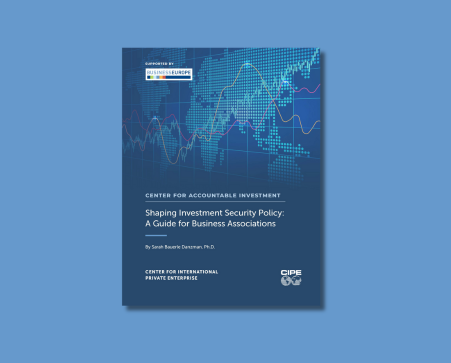Foreword
Shaping Investment Security Policy: A Guide for Business Associations
Emerging geopolitical tensions and concerns about supply chain, health, and food security have recently resulted in greater state intervention in economic affairs, including regulating investments. Governments have increasingly adopted new investment screening mechanisms to gain awareness and transparency over investments in their countries while attempting, simultaneously, to maintain a welcoming investment environment. Business associations and chambers of commerce across the world are struggling to understand the implications of these new screening mechanisms for both the business and governance landscape in their countries.
CIPE and BusinessEurope have collaborated on this project in response to growing demand in Europe and beyond for guidance on meaningfully shaping regulatory policy around investment screening mechanisms. The goal of this report is to provide a playbook, sourced by interviews with European business association leaders, to help association leaders prepare for and navigate the emerging investment security debates in their own countries. We hope that this guide will serve as a useful tool for association leaders in EU accession candidate countries for aligning their approaches and legislation as much as possible with EU norms.
In addition to helping business leaders balance national security equities with an open business environment, CIPE and BusinessEurope also hope that this guide can help elevate the democratic participatory process in the investment screening debate. In a healthy democracy, the proposed regulation of economic activity by the government should be preceded by consultations with business and civil society to ensure that effective policy-making process and government accountability are both firmly in place. Given that the investment screening debate is evolving very quickly on both sides of the Atlantic, both the private sector and civil society need to be educated, engaged, and able to advocate for their interests and for accountable governance. The active involvement of business associations and chambers of commerce in the policy development process will not only generate greater government accountability, but also more effective legislation and greater compliance by the business community.
Sarah Bauerle
Political Scientist and Associate Professor of International Studies at the Hamilton Lugar School of Global and International Studies at Indiana University, Bloomington
Jeff Lightfoot
Program Director, Europe at CIPE
Sofia Bournou
Senior Adviser at BusinessEurope
Published Date: May 16, 2023
